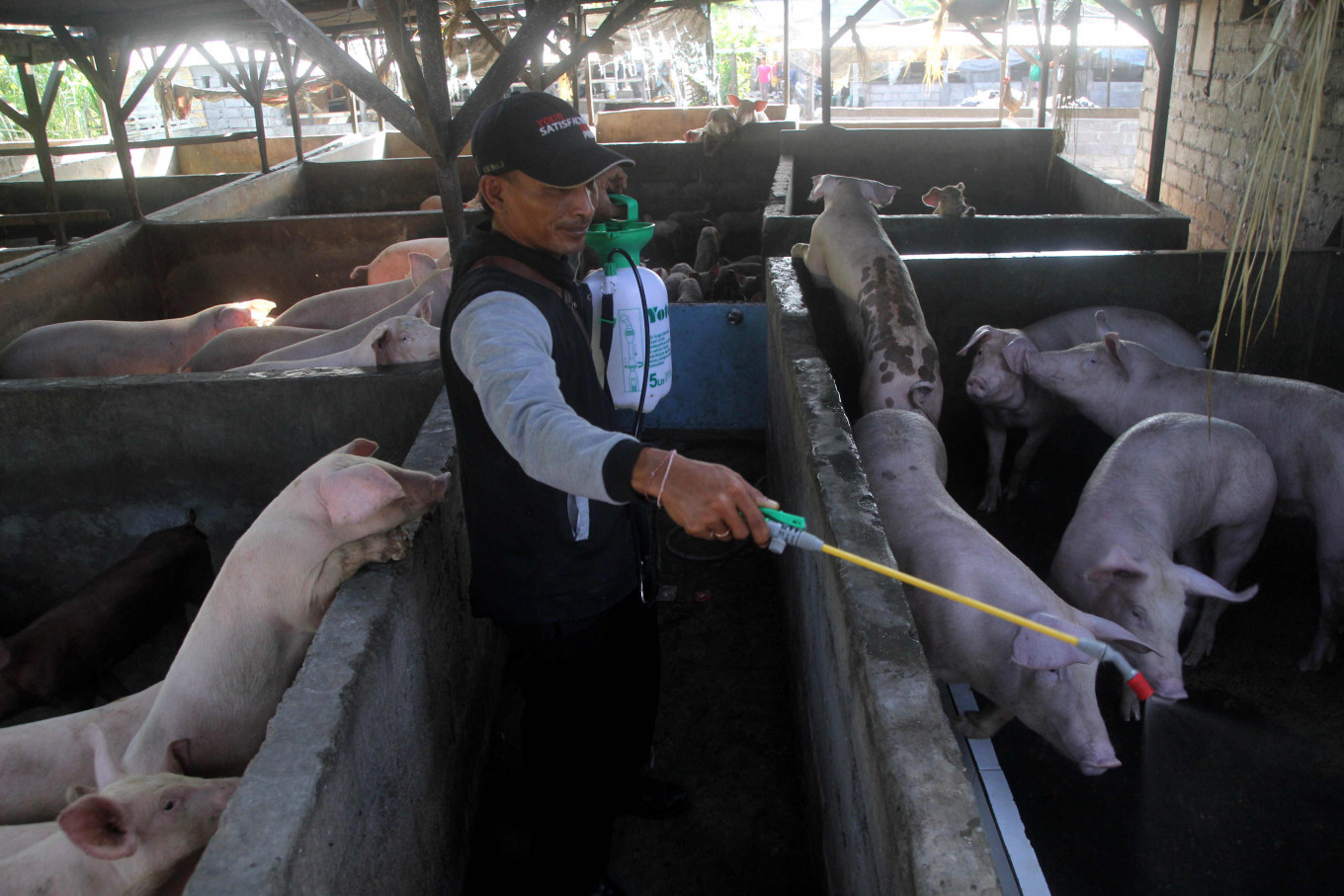Popular Reads
Top Results
Can't find what you're looking for?
View all search resultsPopular Reads
Top Results
Can't find what you're looking for?
View all search resultsKeep calm, eat pork: Bali official changes tune, saying swine fever not confirmed yet
Bali Agriculture and Food Security Agency head Ida Bagus Wisnuardhana said on Friday he only “suspects” that Afrian swine fever (ASF) killed the pig. The Agriculture Ministry will likely take another three months to obtain lab test results and confirm the source of the outbreak, he added.
Change text size
Gift Premium Articles
to Anyone
A
frican swine fever, a disease previously blamed for the deaths of nearly a thousand pigs in Bali, is now being called unconfirmed, according to an official, backtracking from a previous confirmation.
Bali Agriculture and Food Security Agency head Ida Bagus Wisnuardhana said on Friday he only “suspects” that Afrian swine fever (ASF) killed the pig. The Agriculture Ministry will likely take another three months to obtain lab test results and confirm the source of the outbreak, he added.
Read also: Bali confirms swine fever outbreak amid numerous pig deaths
The illness has killed over 880 pigs over the past two months. No deaths were reported in the past week, Wisnuardhana said.
“It’s not a matter of whether it is [ASF] or not. The important thing is that there are no dead pigs anymore. The task is done,” said Wisnuardhana, adding that his team would continue to closely monitor the outbreak daily.
The official’s change of tune could quiet concerns that the fatal virus will hurt Bali’s pork industry. Parts of the island’s population depend on pig farming for a living.
The agency has been spreading public awareness that the illness is not contagious to humans and Bali-bred pork can be consumed safely. It is also presenting information about how to properly feed pigs and handle suspected ASF-infected pigs to prevent further spread
Agriculture Ministry animal health director Fajar Sumping Tjatur Rasa said the ministry had not yet released an official statement on the matter as of Thursday.
But just like Wisnuardhana, Fajar argued that seeking ways to mitigate infections was more important than declaring the causes of an outbreak.
He added that the illness did not affect exports as the country was still “freely” sending live pigs from Pulau Bulan in Batam to Singapore with Singapore-approved biosecurity standards. Fajar estimated that the ministry was currently exporting 25,000 live pigs every month from Pulau Bulan while the country currently did not import live pigs.
Statistics Indonesia (BPS) data shows that Indonesia’s pig export value was US$44.9 million between January and September of last year, up 9.22 percent from $41.01 million in the same period in 2018. About 14,893 tons was sent to Singapore in the first half of 2019, higher than the 13,194 tons recorded in the previous year.
Farmers have complained that the unconfirmed announcement could ruin farmers’ earnings due to falling prices and low demand from the widespread worries ahead of religious festivities like Galungan, which usually causes a spike in pork consumption. Galungan this year will begin on Feb. 19 and end on Feb. 29.
Bali Pig Farmers Association (GUPBI) chairman Ketut Hari Suyasa said on Thursday that Balinese officials should have waited for ministries to deliver an official statement as only ministerial-level officials were allowed to declare an outbreak.
This is because lengthy procedures need to follow such an announcement, starting with the containment of pigs in affected areas and followed by the culling of sick pigs, which he estimated could cause trillions of rupiah in losses.
“If regional officials are confident that the outbreak is true, how ready are they to mitigate the ASF?” Ketut said. “I don’t think that the decision was wise for the current situation.”
Read also: 'It's safe to eat pork': Bali launches campaign against swine fever outbreak with delicacies
No pigs have been culled as of Friday and pork prices in the market remain normal, the Bali Agriculture and Food Security Agency reported.
The agency’s head estimated that the deaths of the 888 pigs caused Rp 2.66 billion in direct losses at an average price Rp 3 million per pig.
But Bali is not alone in facing the illness. North Sumatra has also identified pig diseases following an ASF outbreak that killed more than 50,000 pigs across the province last year.
The epidemic also perturbed China in August 2018. It moved south to Vietnam, onto Luzon Island in the Philippines and reached Timor Leste by October 2019. It has resulted in the death of hundreds of millions domestic pigs, driving up meat prices and causing economic problems, especially in pork’s top-consuming country: China.
According to the World Organization for Animal Health (OIE), ASF is caused by “a large-DNA virus of the Asfarviridae family”. While ASF is not a risk to human health, the disease can be transmitted to other pigs through direct and indirect contact, such as through “ingestion of contaminated material”.
There is currently no antidote or vaccine, and the only known method to prevent the disease from spreading is a mass cull of the infected livestock.










